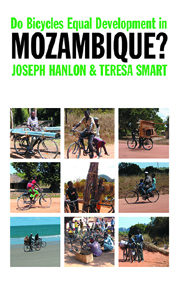Book contents
Appendix 1 - Aid
Published online by Cambridge University Press: 05 April 2013
Summary
In 1990, toward the end of the war, Mozambique was the 6th most aid-dependent country in the world, with aid accounting for 41% of GDP. Since then, aid levels have remained high; in 2004 aid was only 20% of GDP, but that still made Mozambique the 14th most aid-dependent country, according to UNDP. Aid at $63 per capita in 2004 was lower than that in 45 other (mainly smaller) countries, including quite rich nations like Israel, but it is nearly double the $33 average for both the least developed countries and sub-Saharan Africa (Watkins 2006:Table 18). So Mozambique clearly remains a donor darling.
The most detailed aid data are collected by the OECD Development Assistance Committee. Four tables have been extracted from that data base to give details of aid to Mozambique since independence. Unfortunately, the various data bases do not totally match up, so in some places we have had to make assumptions, explained below.
Table A1.1 gives the total aid to Mozambique as reported by the donors and lenders themselves. Aid is known as ‘Official Development Assistance (ODA)’ and includes grants and ‘concessional’ loans ‘with promotion of economic development and welfare as the main objective’. A loan is treated as ‘concessional’ if at least 25% is effectively a grant (actually quite a small portion). In Table A1.2 we show aid divided into grants and loans; loan repayments in the final line are shown as negative numbers.
- Type
- Chapter
- Information
- Do Bicycles Equal Development in Mozambique? , pp. 209 - 214Publisher: Boydell & BrewerPrint publication year: 2008



